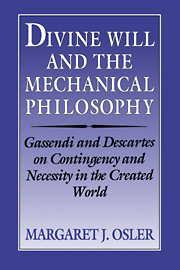 Divine Will and the Mechanical Philosophy
Divine Will and the Mechanical Philosophy Published online by Cambridge University Press: 11 September 2009
Physics can be defined as “the contemplative science of natural things,” since through it we explore how complex a thing is, of what species it is, how much of it there is, of what principles it consists, by what cause it is produced, and what effect it brings about. … If these things are understood, then the nature of the thing … is understood.
Pierre Gassendi, Syntagma philosophicumIn earlier chapters, I discussed the reasons why Gassendi considered it necessary to modify Epicureanism in order to render it theologically acceptable. I then argued that a close relationship existed between his voluntarist theology and his empiricist theory of scientific knowledge. In this chapter, I argue that his theories of matter and causality were enmeshed in his epistemology and that they thus indirectly reflected the theological assumptions that informed his entire philosophical enterprise.
Gassendi was not the first advocate of atomism in the seventeenth century, but he was surely the most systematic. His coupling of atomism with the astronomy of Copernicus and the physics of Galileo, as well as his commitment to ridding atomism of the theologically objectionable doctrines traditionally associated with Epicureanism, set him apart from earlier advocates of the atomic theory and probably account for the ultimate success of his project. Like Gassendi, one early-seventeenth-century atomist, David van Goorle (d. 1612) was also concerned to refute Aristotle. Sebastian Basso (fl. 1550–1600) advocated atomism as an alternative to Aristotelianism, which he criticized at length in Philosophiae naturalis adversus Aristotelem (1621).
To save this book to your Kindle, first ensure no-reply@cambridge.org is added to your Approved Personal Document E-mail List under your Personal Document Settings on the Manage Your Content and Devices page of your Amazon account. Then enter the ‘name’ part of your Kindle email address below. Find out more about saving to your Kindle.
Note you can select to save to either the @free.kindle.com or @kindle.com variations. ‘@free.kindle.com’ emails are free but can only be saved to your device when it is connected to wi-fi. ‘@kindle.com’ emails can be delivered even when you are not connected to wi-fi, but note that service fees apply.
Find out more about the Kindle Personal Document Service.
To save content items to your account, please confirm that you agree to abide by our usage policies. If this is the first time you use this feature, you will be asked to authorise Cambridge Core to connect with your account. Find out more about saving content to Dropbox.
To save content items to your account, please confirm that you agree to abide by our usage policies. If this is the first time you use this feature, you will be asked to authorise Cambridge Core to connect with your account. Find out more about saving content to Google Drive.